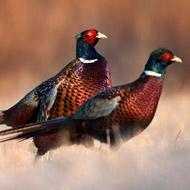AHVLA report identifies various non-compliances with legislation
The AHVLA has released a report of findings from gamebird welfare inspections in Scotland. The report follows the introduction in 2011 of the Code of Practice for the welfare of gamebirds reared for sporting purposes. The Scottish Government asked AHVLA to undertake a series of visits in 2013 to units rearing gamebirds in Scotland, to assess compliance with the Code of Practice and advise on other relevant legislation.
AHVLA staff inspected a wide spectrum of the gamebird industry, ranging from a farmer placing 250 pheasant pullets for a family shoot, to a unit that took 150,000 eggs. There was a range of systems, from hatcheries which bred their own stock, through those purchasing eggs, day old chicks or six-week-old-pullets to those buying birds of up to 12 - 14 weeks of age.
The inspections were carried out by a total of 18 veterinary officials and animal health officers. They used a scoring system similar to that used for recording the welfare of farmed animals; units were given an A score if they met the requirements of the Animal Health and Welfare Act (Scotland) 2006, a B score if they complied with the Act but not all aspects of the code, a C score if they failed to comply with the Act, but no unnecessary suffering was seen, and a D score if they were non-compliant with the Act and unnecessary suffering was identified.
Although the visits found no non-compliance with animal welfare legislation, some areas for improvement, including better record keeping for mortalities and medicine use, were suggested. The most frequent failure was related to disease treatment and record keeping; the issues were not due to lack of treatment, but record keeping. This was often due to poor quality records rather than a total lack of records.
For a full summary of the report, please visit: www.scotland.gov.uk/Resource/0045/00454950.pdf.







 Birmingham Dogs Home has issued an urgent winter appeal as it faces more challenges over the Christmas period.
Birmingham Dogs Home has issued an urgent winter appeal as it faces more challenges over the Christmas period.
